Key Takeaways
AI saves real estate agents an average of 15 hours per week while improving lead conversion rates by up to 40%.
Applying the 85/15 rule lets AI handle 85% of routine tasks while you focus your expertise on the critical 15% requiring human judgment.
Always maintain human oversight of AI-generated content to ensure Fair Housing compliance, accuracy, and ethical standards.
Start with one AI tool, master it completely, then gradually expand your technology stack based on measurable results.
Treat AI prompts like detailed conversations with specific context, role assignments, and format specifications for best results.
AI for Real Estate Agents: Tools, Tips, and Strategies Transforming 2025
AI for real estate agents is reimagining the property sector, with new figures revealing that 78% of real estate agents are using AI tools to boost productivity and client services. Research shows that real estate agents are saving approximately 15 hours a week on administrative tasks, while also improving lead conversion by as much as 40%. This change isn't coming; it's already underway and has fundamentally changed how agents do business, market property, and fulfill their clients' needs in an increasingly competitive landscape.
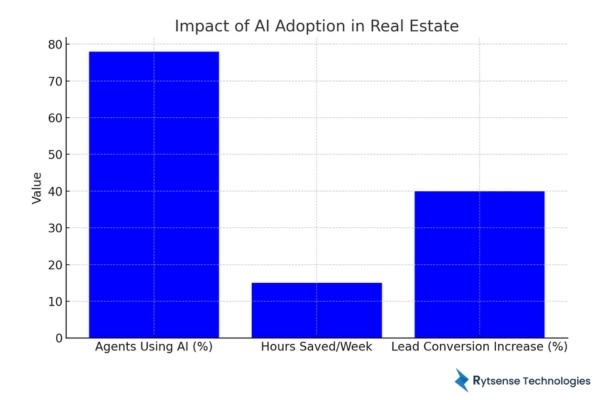
The Rise of AI for Real Estate Agents
Why Real Estate Agents Can’t Afford to Ignore AI
The real estate world is changing. Agents who won't accept new technology to better serve clients will get left behind by their competitors, who are now able to respond faster, develop more accurate market analyses, and improve the client experience. Now clients expect an immediate response rate, data-driven recommendations, and seamless digital experiences. New AI tools for real estate agents allow them to meet those needs in a practical, comprehensive manner.
The pressure of the market also require agents to be more efficient. Time spent in managing listings, nurturing leads, and building marketing materials is precious, and could be spent building relationships, negotiating deals, and closing transactions. AI minimizes bottlenecks, allowing agents to spend more time on the high-value tasks which put money in their pockets.
How AI Is Transforming the Real Estate Industry
AI for real estate agents is changing the way it is executed across the board. We have machine learning algorithms that can forecast market trends with amazing accuracy and natural language processing. It creates engaging property descriptions at the click of a button and uses computer vision to improve property photos with no effort. We even have predictive analytics that creates qualified leads before they are even looking for a property.
This is not just about individual productivity. Entire AI enhanced platforms can now handle client communication, viewing requests, perform analysis on properties, and even predict which listing will sell first. It shifted from a pilot study to a necessity and is a key component of today's real estate practice.
The most effective AI agent for real estate is providing measurable ROI through time savings, improved accuracy, and better client experience. Agents are closing more transactions in less time, helping their profits and also making their work-life balance easier.
Key Benefits of AI for Real Estate Agents
| Benefit Category | Impact | Time Saved |
|---|---|---|
| Administrative Automation | Reduced paperwork and scheduling | 8-10 hours/week |
| Lead Generation | Higher quality prospects | 5-7 hours/week |
| Content Creation | Faster marketing materials | 3-5 hours/week |
| Market Analysis | More accurate pricing | 2-4 hours/week |
| Client Communication | Faster response times | 4-6 hours/week |
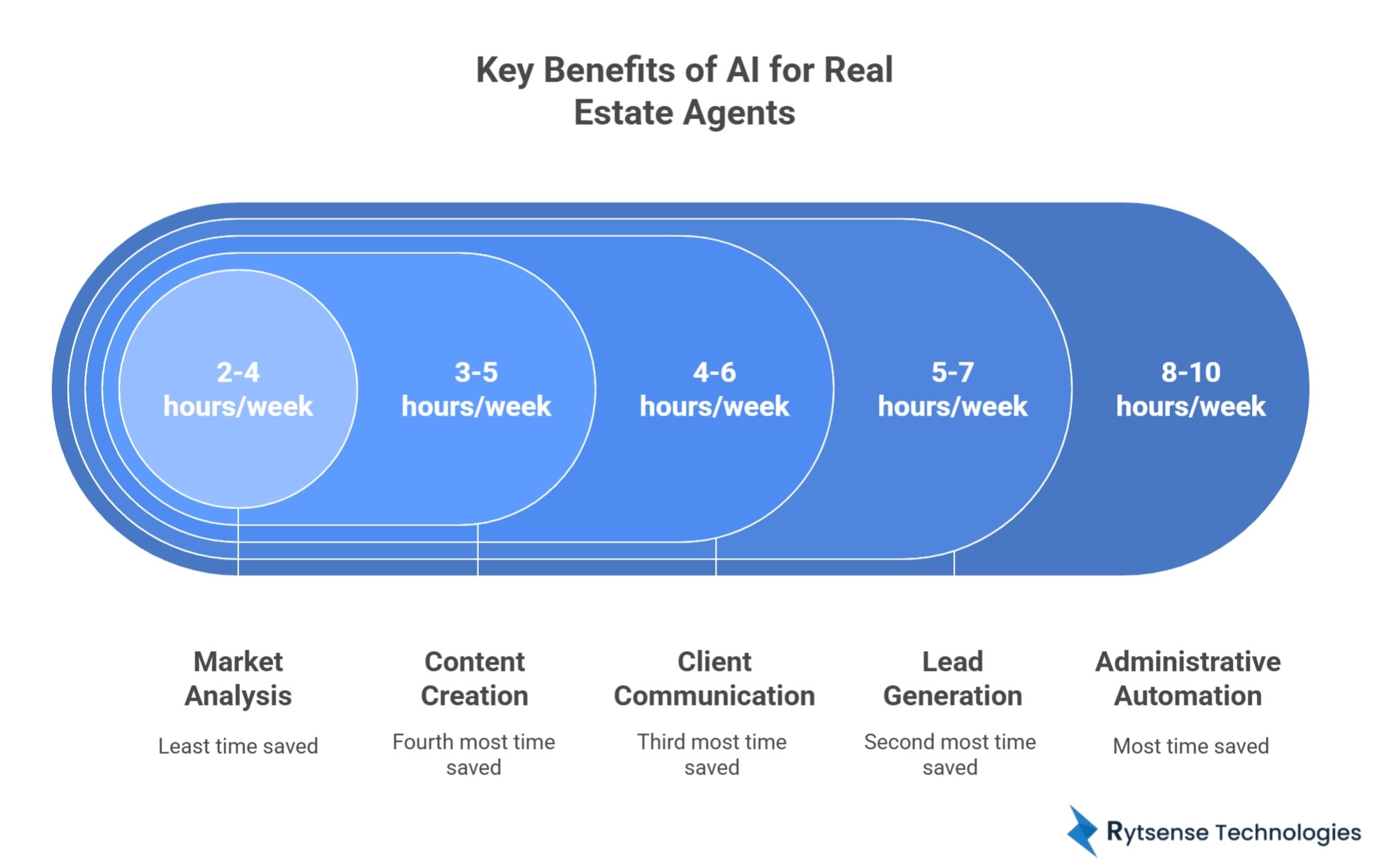
How AI for Real Estate Agents Is Being Used in 2025
Quick Wins: 10 AI Tasks Agents Can Automate Today
- Draft Email Responses: AI drafts personalized responses to frequently asked questions in seconds
- Scheduling Appointments: Automate a showing schedule with little to no back and forth
- Social Media Posts: AI generates posts with proper hashtags and timing for the platform
- Client Follow-Up: Automatically nurture campaigns and keep your clients engaged electronically without effort
- Market Update Newsletters: AI packages and compiles neighborhood stats and local trends into a formatted newsletter
- Transaction Timeline Management: Automating dates, deadlines of transactions and sending reminders
- Summarize Documents: AI summarizes vital points from long contracts and disclosures
- Lead Qualification: Algorithms score a prospect's likelihood based on behavior
- Match Property to Client: AI matches prospective listings to their preferences and search history
- Price Adjustment Alerts: Systems Notify agents when market conditions suggest pricing changes.
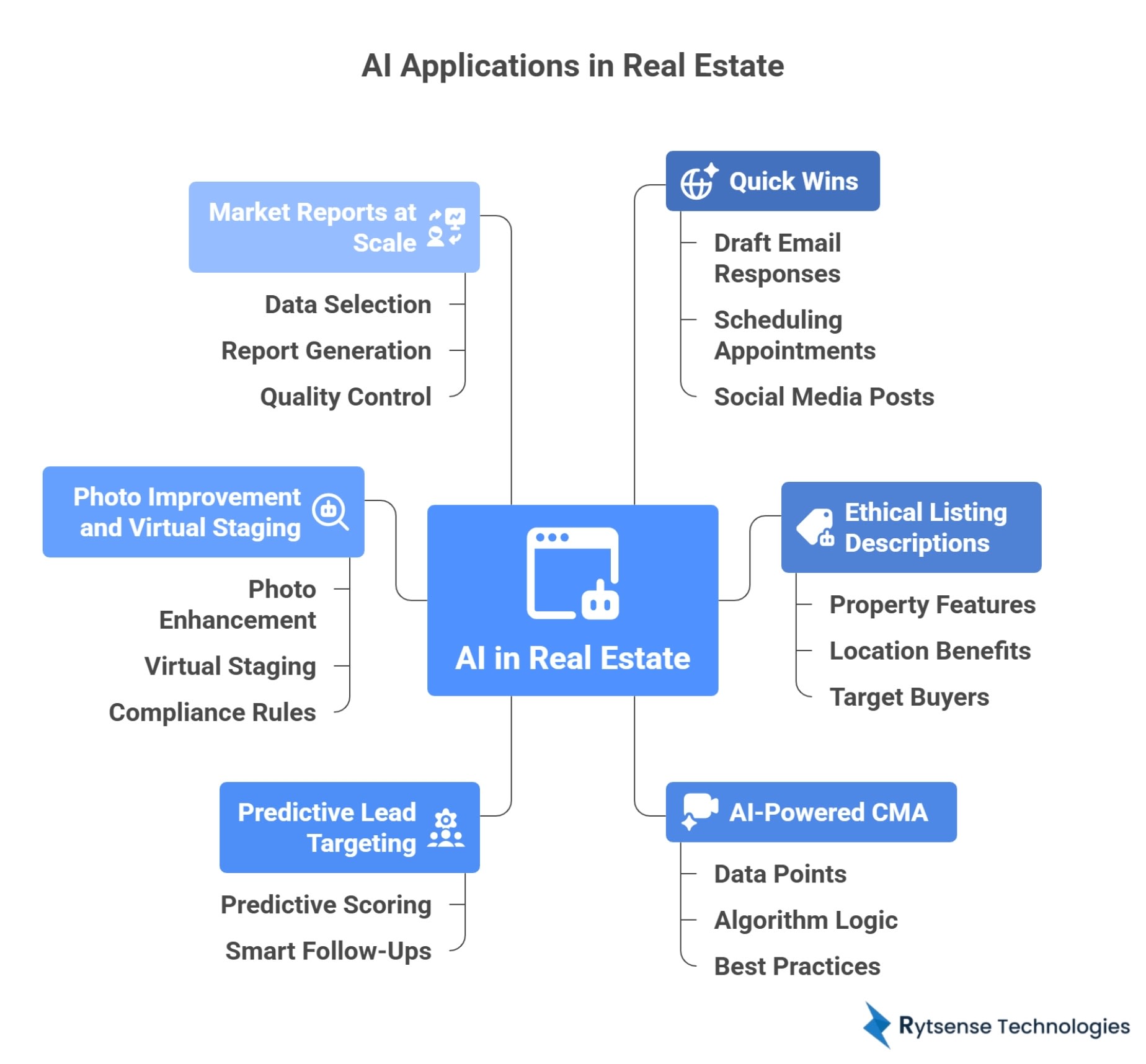
Writing Ethical Listing Descriptions with AI
How to Use AI for Property Descriptions
Sample: Make 150-word listing description for a 3-bedroom, 2-bathroom home in the USA. Show one of the recently renovated kitchen with quartz countertops, large backyard best for entertaining, and closeness to top-rated schools. The tone should to be professional.
Later, AI will generate the draft for you, and you can personalize this draft using your particular tone and accuracy. But do not publish AI content without thorough review and personalization.
Compliance Checklist for AI-Generated Content
- Remove any language that could violate Fair Housing laws
- Verify every factual claim about property features and measurements
- Make sure descriptions don't imply demographic preferences
- Avoid certain subjective terms that could be considered discriminatory
- Check that amenities and features are accurately represented
- Confirm compliance with MLS requirements and character limits
- Check for grammatical accuracy and also readability
AI-Powered Comparative Market Analysis (CMA)
How AI Improves CMA Accuracy
Machine learning models attach weights to each of these data points based on the historical accuracy of the model, thus, increasing the predictive capacity of the CMA on the value. From this, the resulting CMA will depict the current market trends more accurately compared to a CMA than through manual analysis alone.
Best Practices for AI-Driven CMAs
| Practice | Description | Outcome |
|---|---|---|
| Verify Data Sources | Confirm AI uses current MLS and public records | Increased accuracy |
| Review Algorithm Logic | Understand how AI weights different factors | Better client explanations |
| Cross-Reference Results | Compare AI outputs with manual analysis | Validation of findings |
| Document Methodology | Keep records of how pricing was determined | Compliance protection |
| Update Regularly | Refresh CMAs as market conditions change | Current recommendations |
Always include AI-generated CMAs when you provide your professional judgment. The technology is the base for the data, but you add context to the results, specifically for particular properties and client situations.
Predictive Lead Targeting and Smart Follow-Ups
Next, that predictive score is built into your system using the new AI smart follow-ups, which analyse that predictive score to set a series of follow-up touchpoints. So, for example, if a lead has gone back to the website multiple times looking at waterfront properties, and therefore your system is automatically sending a series of relevant listings every time a lead visits. If a lead did not take any action for two weeks, the system starts the re-engagement campaign. The goal is to increase the conversion rate and optimize your time.
AI in Photo Improvement and Virtual Staging
Compliance and Quality Best Practices
Compliance Rules:
• Always disclose the image was virtually staged.
• Never change or manipulate structural aspects or add elements that do not exist.
• Only enhance photos that accurately represent the condition of the property.
• Maintain the original, unaltered versions of the images for custodial purposes.
• Adhere to the rules for disclosing image use by the MLS or any other platform used to publicize the property.
Generating Market Reports at Scale
AI software for real estate agents can take the raw data we have and present it as a finished market report for our clients. After choosing from a geographic area, price range, and time period, AI generates a finished report that includes data in charts and graphs, trend analysis from the past, and predictive text.
Despite seeming trivial, a capability like this gives agents the ability to provide valuable market information. It is given to their entire database of clients and prospects without spending hours of time coming up with a manual report. Reports generated on a regular basis place agents in the trusted advisor position. Also, they keep their name top of mind with past clients and prospects.
Want to streamline your workflow and get more time back for client relationships and closing deals?
Start implementing AI tools that support your real estate practice, without adding complexity.
7 Actionable AI Tips for Real Estate Agents
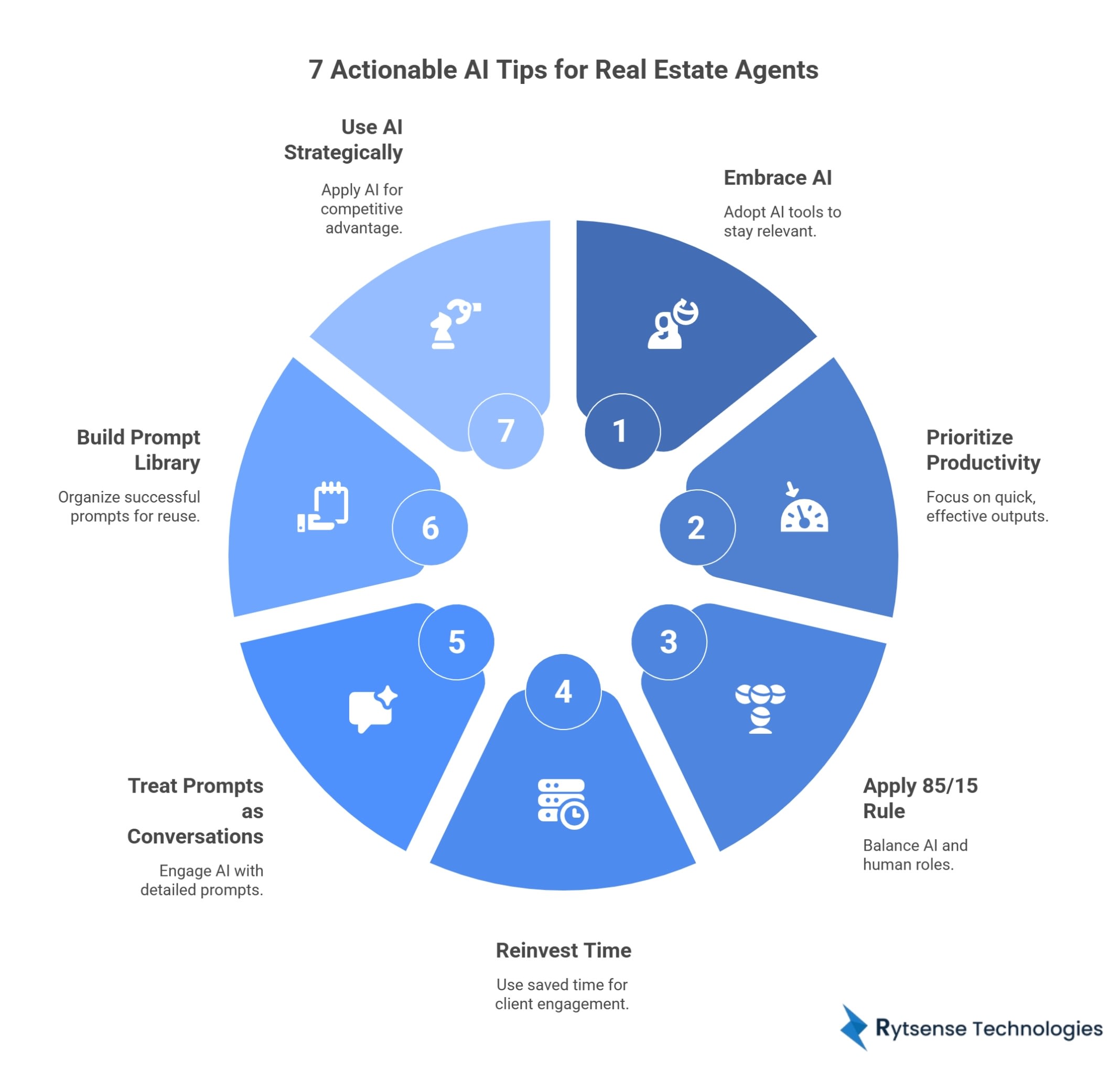
Embrace AI; It’s Here to Stay
Prioritize Productivity Over Perfection
Apply the 85/15 Rule for AI-Human Balance
Reinvest Time Saved Through AI Into Clients
Treat AI Prompts Like Conversations
Build a Prompt Library for Consistency
Use AI Strategically to Stay Competitive
Essential AI Tools for Real Estate Agents
Best AI Platforms for Daily Operations
| Tool / Category | Primary Function | Key Features |
|---|---|---|
| ChatGPT/Claude | Content generation | Listing descriptions, emails, market reports |
| Zillow AI | Property valuation | Automated estimates, market analysis |
| Compass | Collections | Client collaboration, AI-powered property recommendations |
| Sierra Interactive | Lead management | Predictive scoring, automated follow-up |
| Structurely | Lead qualification | AI chatbot for initial prospect screening |
| BoxBrownie | Photo enhancement | Virtual staging, image optimization |
| Lofty | CRM with AI | Intelligent lead routing, communication tools |
Integrating AI Tools into Your Workflow
Start with one AI tool. Master it, and then add other tools. Train your team accordingly, looking at accurate protocols for usage, ethics, and quality control. Have a clear procedure established for when to utilize AI and when it is best to obtain human judgment.
Store your metrics before and after using AI for real estate agents, and measure time saved, lead conversion rate, client satisfaction scores, and revenue metrics. This will ensure that your AI investments have a return parallel to the costs.
Choosing the Right AI Solutions for Your Business
Relevant Functionality: Choose features that actually match your workflows, rather than paying for extras that won’t be used.
Easy Integration: The right solution should work smoothly with your existing CRM, property management systems, MLS platforms, or internal tools. Seamless integration prevents duplicate data and keeps processes efficient.
User-Friendly Interface: A clean, intuitive UI helps your team use the system comfortably without heavy training.
Security and Compliance: Ensure the platform aligns with GDPR, CCPA, and any real estate-specific privacy guidelines so your data stays protected.
Scalability: Look for solutions that can adapt as your operations grow, so you don’t need to rebuild or switch platforms later.
Reliable Support: Good onboarding, responsive support, and ongoing guidance make adoption much smoother.
If you’re exploring partners, Rytsense Technologies is often considered by businesses looking for the best AI development company in the USA — especially where practical implementation and real operational impact matter more than just technology for the sake of it.
Boost your lead conversion, market smarter, and stay competitive in 2025 and beyond. AI can help you work faster without compromising personal connection.
Risks, Ethics, and Security in AI for Real Estate Agents
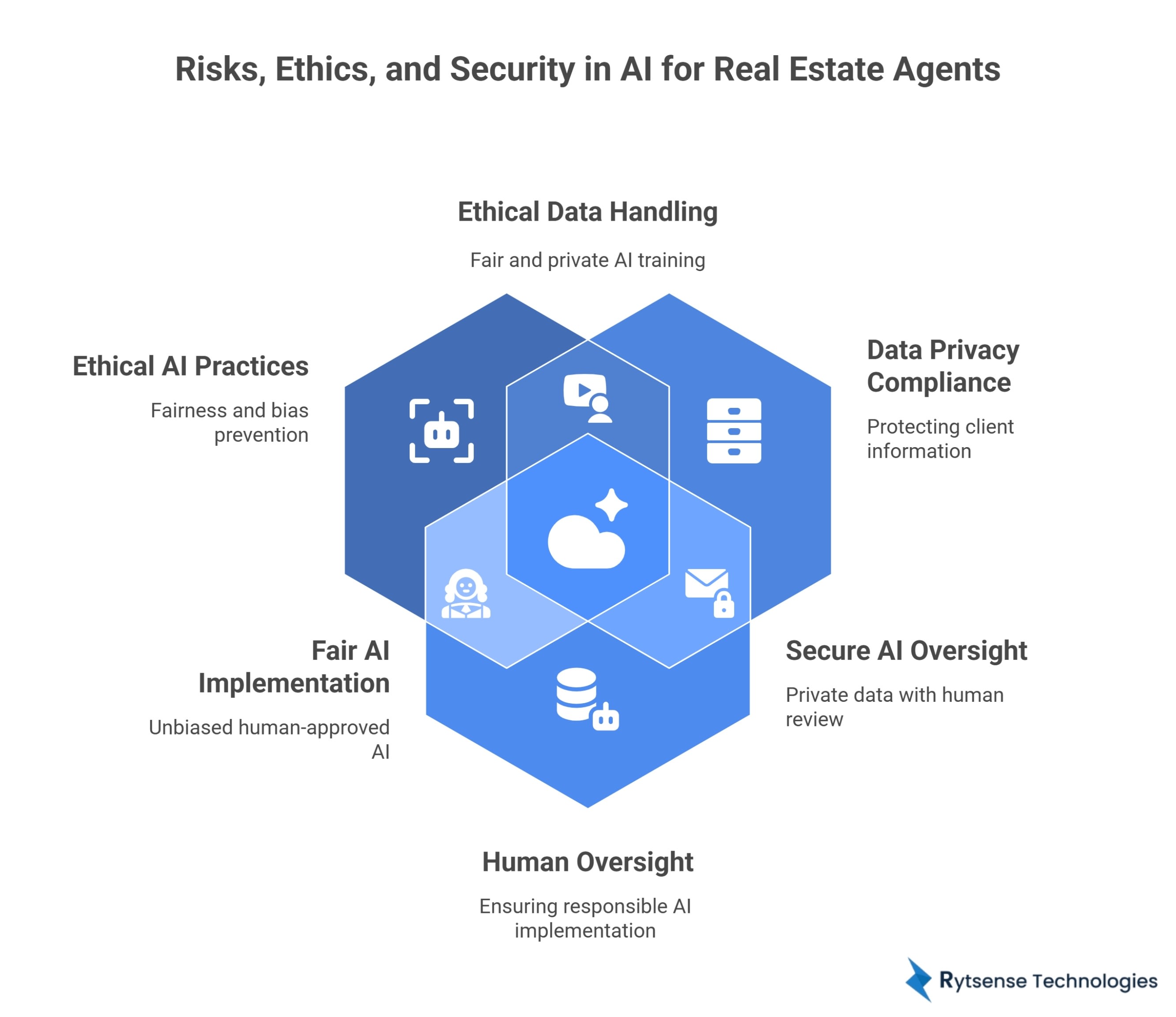
Recognizing AI Bias and Staying Fair Housing Compliant
Suggesting that you should be targeting specific demographic groups through certain suggestions of AI
- Are the algorithms undervaluing properties in identifiable neighborhoods?
- Are there any lead-scoring criteria based on protected class characteristics?
- Marketing tools that exclude certain populations from viewing listings.
From a Fair Housing compliance standpoint, you are liable for any discriminatory outcomes even when it was a result you did not personally create, but yet occurred through an automated system.
Data Privacy and Legal Considerations
- Where it is stored (domestically or internationally
- Who has access to your information
- For how long the platform stores information
- Whether the data you provide is used to train the AI or accessible to third parties
- What happens to your data if you discontinue the service
Do not upload confidential client financial information to AI, social security numbers, or any other protected data to a public AI platform. Use enterprise-compliant platforms instead of unsecured public applications.
Maintaining Human Oversight
- Pricing recommendations and CMAs
- Legal documents and contractual language
- Fair housing implications in communications
- Financial calculations influencing real estate transactions
- Client advice on complicated situations
- Documenting your review process can show due diligence if questions arise later.
Building AI Skills for Real Estate Agents
Learn Prompt Engineering for Real Estate Applications
- Prompt engineering is critical because it transforms generic AI responses into tailored real estate insights
- Be Specific: The more detail you can provide means the better AI will respond to your inquiry. Instead of submitting a request such as “draft an email” you could write “Draft a 150-word email to a seller client explaining why we should reduce the listing price by 5% because we have been on the market for 30 days and only had two showings.”
- Role Assignment: Assign the AI a role to embody. For example, if you request the AI to respond “you’re a luxury real estate agent preparing a response for high-net-worth clients” it will have a noticeably different language and overall tone than if you tell it “you’re a first-time homebuyer helping someone understand the process.”
- Format Specification: Specify precisely what framework you require. "Create a point list of 5 home maintenance tips for new homeowners" will give different results than "Write a conversational paragraph about home maintenance."
- Constant Changes: Treat interactions with AI as ongoing conversations. If the initial response is not what you expected, you can offer feedback: "Can you make this tone more professional" or "add some local market examples."
AI Training and Certification Options
- National Association of Realtors (NAR): AI and technology courses offered through Realtor University
- Real Estate Technology Institute: AI training specialty with a modular course designed for property professionals
- LinkedIn Learning: Offers real estate–specific AI courses with completion certificates.
- Coursera and Udemy: Some affordable beginner-level AI fundamentals that can be geared toward business scenarios
Agents who invest time in learning stand out from those who merely experiment with AI. Make it a goal to commit some amount of time each month to learn something new and improve your mastery of skills and tools.
Future Trends in AI for Real Estate Agents
- Enhanced Predictive Analytics: AI will predict potential market appreciation for individual properties even more accurately, allowing agents to counsel clients more effectively concerning their prospects for investment.
- Autonomous Coordination of Transactions: AI systems will generate entire transaction timelines such that coordination with lenders, inspectors, and title companies will require minimal agent involvement.
- Hyper-Personalized Experiences for Clients: AI will synthesize individual client preferences across a multitude of variables and suggest properties that have immediate relevance.
- Voice-Activated AI Assistants: Agents will talk with AI to receive real-time information for existing clients in multiple settings, such as during showings or direct client interactions.
- Integration of Blockchain: AI and blockchain technology will allow for processes such as title transfers, execution of contracts, and payment processing to be performed seamlessly.
Keeping a close watch on these developments positions that leads agents to understand and adopt breakthrough technologies before their competitors.
Conclusion
AI for real estate agents has transitioned from a concept to a necessity of running a business. Agents that integrate AI tools into their business plan and work within an ethical framework will be the most successful in their marketplace.
The combination of computers completing mundane tasks while humans connect and making the deeper, complex decision-making process is a great competitive advantage.
Ready to reduce busywork and focus more on your clients?
AI can take over the repetitive tasks so you can spend your time where it matters.
Meet the Author

Karthikeyan
Connect on LinkedInCo-Founder, Rytsense Technologies
Karthik is the Co-Founder of Rytsense Technologies, where he leads cutting-edge projects at the intersection of Data Science and Generative AI. With nearly a decade of hands-on experience in data-driven innovation, he has helped businesses unlock value from complex data through advanced analytics, machine learning, and AI-powered solutions. Currently, his focus is on building next-generation Generative AI applications that are reshaping the way enterprises operate and scale. When not architecting AI systems, Karthik explores the evolving future of technology, where creativity meets intelligence.